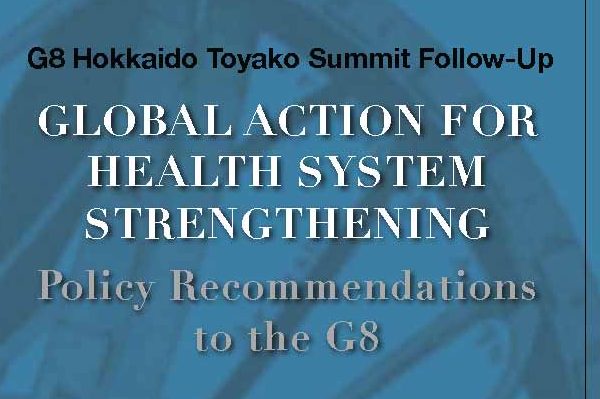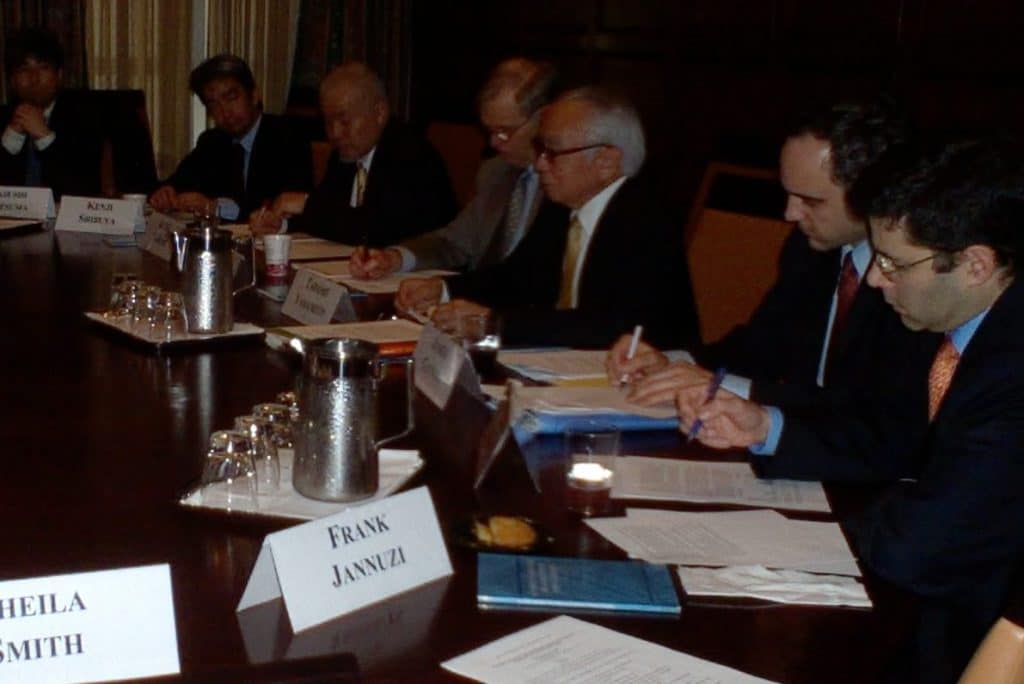From 2008 to 2009, JCIE’s Executive Committee on Global Health and Human Security organized a Task Force on Global Action for Health System Strengthening. That task force produced a report that was the focus of two dissemination seminars in Washington DC, one on March 17 that was organized in collaboration with the Center for Global Development (CGD) and that targeted experts from think tanks and US government agencies, and another on March 19 in collaboration with InterAction, which targeted representatives of humanitarian and development NGOs. Both seminars featured an overview of the recommendations by Keizo Takemi, followed by brief remarks by Kenji Shibuya and Yasushi Katsuma, comments by members of the collaborating organizations, and open discussion.
The participants in the CGD seminar applauded the task force’s emphasis on health system strengthening but cautioned against giving donors justification to cut back funding on disease-specific programs that have proven successful, particularly in a time of financial crisis when it will be difficult to maintain budgets for global health and other areas of development. They also welcomed the task force’s recommendation that country ownership and decision-making capacity should be strengthened. And, they suggested that expanding the discussion to a more inclusive group than the G8 might be one way to improve country ownership.
Participants were also interested in learning why the working group is emphasizing health information in the next phase of activities, for which the team gave two primary reasons. First, there is increased attention to supporting global health, but there is not sufficient empirical information on which to base decisions about what health services to prioritize. Without strong mechanisms for proving that resources are having a positive impact, there is a risk of losing political momentum and support for financing for health. Second, other major stakeholders have taken up other building blocks, such as the UK government’s commitment to health financing, leaving health information as an area in which Japan might have a comparative advantage.
The discussion at the InterAction seminar brought to the table a number of challenges to strengthening health systems around the world. The first challenge dealt with definitions and parameters. While there tends to be general agreement that health systems and primary healthcare need to be strengthened, there is no consensus on how the various building blocks of health systems fit together or what should be included in primary healthcare.
But, while developing a common understanding is important in the long term, vital programs to save people’s lives cannot be put on hold in the short term while these issues are being discussed. The second challenge is a lack of information, which is needed for countries to make decisions on what to prioritize, what activities to strengthen and which to cut back on, and what level of resources is needed for any given service. The MDGs have proven more appealing because they represent a global commitment to particular priorities and set out clear targets and indicators of success, but there is nothing like that for health system strengthening. Other challenges that were brought up included rebuilding health systems in post-conflict settings, dealing with rapid urbanization in many developing countries, using technology more effectively, and figuring out how to engage communities.
March 17
Welcome remarks: Center for Global Development
Introduction to the project: Tadashi Yamamoto, President, Japan Center for International Exchange (JCIE); Director, Working Group on Challenges in Global Health and Japan’s Contributions
Global Action for Health System Strengthening: Overview of Policy Recommendations and Opportunities for US-Japan Collaboration
Panelist: Keizo Takemi, former Senior Vice Minister of Health, Labour and Welfare, Japan; Research Fellow, Harvard School of Public Health; Senior Fellow, JCIE; Chair, Working Group on Challenges in Global Health and Japan’s Contributions
Comments: Rachel Nugent, Deputy Director, Global Health Program, CGD
Next Steps: Strengthening Health Information Systems
Panelist: Kenji Shibuya, Professor, Department of International Health Policy and Planning, Graduate School of Medicine, University of Tokyo
Discussion
Concluding comments: Keizo Takemi
A Conversation with Professor Keizo Takemi
March 19
Welcome
Opening remarks: Sam Worthington, President and CEO, InterAction
The G8 and Global Health: Emerging Architecture from the Toyako tations
Panelist: Keizo Takemi
Discussant: Diana Silimperi, Vice President for Health Services, Management Science for Health
Open Discussion
Moderator: Lindsay Coates, Vice President of Policy and Communication, InterAction


